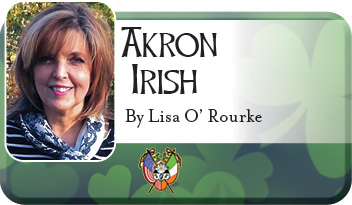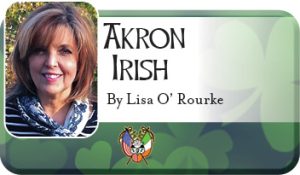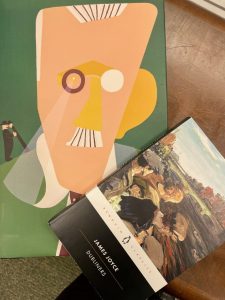

Akron Irish: Every Blooming Thing
By Lisa O’Rourke
This past February marked a big anniversary, no less than one hundred years, since the publication of a, and maybe the, penultimate banned book. Like the Bible and Moby Dick, it is a book that many people know of, claim to have a relationship with, but read it, meh, maybe?
The book in question is James Joyce’s Ulysses. Ok, so we may have missed the anniversary party, but the real party with Ulysses happens in June, so we are right on time!
Every year on June 16, people around the world celebrate a day that was frozen in fictional amber. June 16, 1904 is both the day of Leopold Bloom’s mythical ramble around Dublin in Ulysses and the actual date that he met his own Galway girl and future wife, Nora Barnacle.
While he chose that day, it has nothing to do with the plot of his book. Joyce was a superstitious man and chose dates that meant something to him to imbue his creative darlings with whatever luck he could.
Biblical Ulysses
Now about that creative darling, simply put, Ulysses is a book of Biblical proportions that covers a single day in a man’s life. Leopold is not heroic, as the name Ulysses implies. That dichotomy is a snapshot of the book: irony, paradox and the juxtaposition of the heroic and the mundane, mirroring the chapters of the Odyssey, written by that other blind poet, Homer.
Each chapter has distinct characteristics and its own style. Joyce was part of the great generation of expat writers that found themselves in Paris after the first World War. They were all experimenting and pushing each other into modernism.
Joyce found himself wanting to write a book that replicated an “uninterrupted unrolling” of thought. He did not write a single word of the book in Dublin yet boasted that if Dublin had burnt to the ground, his book would be an excellent guide to rebuilding. Up until it went to print, he was writing home to Ireland and asking friends for the latest in slang, pop culture, whatever was going on in the city. He wanted the book to have the voice of the contemporary Dublin. Ulysses is a book that intimidates both on size and reported complexity.
I can’t claim to be a Joyce scholar, but one quote about him made me adore him. He was kind and generous to strangers; he was known to invite waiters to join him at his table for food and drink. Sylvia Beach, proprietor of Shakespeare and Co. and Ulysses’ publisher, said that Joyce “treated people invariably as his equals, whether they were writers, children, waiters, princesses, or charladies.
What anybody had to say interested him; he told me that he had never met a bore. … If he arrived in a taxi, he wouldn’t get out until the driver had finished what he was saying. Joyce himself fascinated everybody; no one could resist his charm.”
Yet, many are resisting his literary charm today. Ulysses continues to be a top choice for book banners. In a world that offers on-demand internet porn, it is baffling that people would take such offense at a book. At almost seven hundred pages, without notes, it is surely not the first choice of anyone looking for a cheap thrill.
Looking at some of the court documentation, it is a funny the tangle that judges found themselves in when the book has been on trial. The book’s language is metaphorical for the most part. This puts the person who is finding offense in a peculiar position, since they have to interpret and explain what it is in their own reading of the material that is so offensive.
 The First Bloomsday
The First Bloomsday
As much as it has supposedly shocked, Ulysses has no shortage of admirers. The first modern celebration of Bloomsday was in 1954, at the 50th anniversary of the fictional events in Joyce’s book. Whilst out one evening, Irish writers Flann O’Brien and Patrick Kavanagh got together with critic John Ryan and a dentist cousin of James Joyce named Tom Joyce, and decided to make a daylong pilgrimage around Dublin, reenacting Bloom’s Day. They were to have stops at the Martello Tower, the opening scene of the novel; Davy Byrne’s Pub, where Bloom eats a gorgonzola cheese sandwich; and 7 Eccles Street, where Bloom and his wife, Molly, lived.
They role-played, acted out the dialogue, and rode in horse-drawn carriages like those in the scene of Paddy Dignam’s funeral.
They were supposed to end up in a shady section of Dublin, where the “Nighttown” chapter of Ulysses is set, but the literary pilgrims got a bit drunk and distracted at a pub about halfway through the route and lost their will to finish it. Of course, more dedicated and less dissipated pilgrims have since completed the journey of Bloom’s fictional wanderings. The celebrations have blossomed yearly.
This year, thousands are anticipated to stay in Dublin during the weeklong celebration of Bloomsday. They will wear Edwardian clothes, including many who will be dressed as Joyce himself. They will eat the food, yes, kidneys and gorgonzola cheese. They will drink the Guinness and they will read the book, publicly and out loud. I met a lady who has gone several times and she said that this is the best way to see Dublin.
Of course, by the time that you are reading this, it will be a little late to book a trip, but that is the gift of literature, it is right there waiting. Buy the book and give it another chance.
Ulysses as a Podcast
Another option and one that I am enjoying myself, is listening to Ulysses as a podcast. The Irish national radio funded a production many years ago whose production has made its way into podcast format. The acting is good and helps separate the multiple voices and tone of the book.
Leopold Bloom was not a hero, but a man who was thoughtful and noticed small things. Like Joyce, he loved people and gave them his full attention. That seems like a great way to celebrate. So, if you feel like giving yourself a little holiday, go on and enjoy your own Bloomsday.
This link is a funny and informative summary. YouTube- Ulysses to go (James Joyce in 18 minutes, English version)
This is a good audio version of the book which was made by RTE years ago and recently rereleased as a podcast. Available where you get your podcasts. https://open.spotify.com/show/4wntQzELHUc6US7lHcdRlS?si=cb39d3c50cbd42d8
*Lisa O’Rourke is an educator from Akron. She has a BA in English and a Master’s in Reading/Elementary Education. Lisa is a student of everything Irish, primarily Gaeilge. She runs a Gaeilge study group at the AOH/Mark Heffernan Division. She is married to Dónal and has two sons, Danny and Liam. Lisa enjoys art, reading, music, and travel. She likes spending time with her dog, cats and fish. Lisa can be contacted at [email protected].
Please send any Akron events to my email so we can share them with our readers!

Monthly newsmagazine serving people of Irish descent from Cleveland to Clearwater. We cover the movers, shakers & music makers each and every month.
Since our 2006 inception, iIrish has donated more than $376,000 to local and national charities.
GET UPDATES ON THE SERIOUS & THE SHENANIGANS!